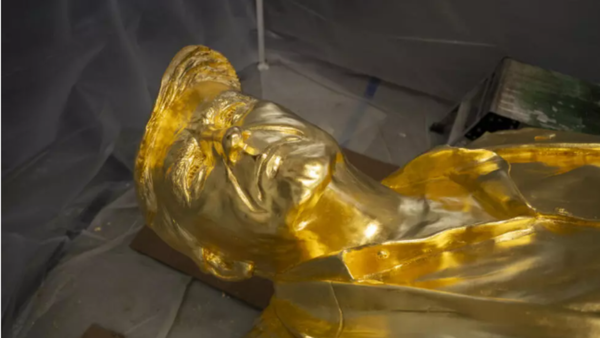
For 150 years, Atelier 11 in the Cité Falguière in Paris has been a home from home for international artists.
The Italian painter Amedeo Modigliani met his Russian mistress here – she was on honeymoon at the time; Constantin Brâncuși, Chaïm Soutine and Paul Gauguin also lived and worked in the studio at various periods before becoming famous.
Built in the early 1870s, Cité Falguière was a commune of artists in a cul-de-sac in Montparnasse where those who had tired of Montmartre or could no longer afford its rents moved to the south of the French capital to paint and sculpt, forming what was known as the École de Paris movement.
In the 1960s and 70s the bulldozers moved in, destroying many of the historic ateliers to construct beige apartment blocks. Those that remain, with the exception of Atelier 11, have been turned into private homes.

Now campaigners who have spent 60 years unsuccessfully lobbying the government and local authorities to classify it as a building of historic interest have organised a fundraising campaign to restore it and continue its role as a home and workspace for visiting artists.
The most urgent work is the renovation of the facade, whose original wood and metal framed windows have been barely touched since they were constructed.
Jessica Chilloh, who is coordinating the renovation project for the not-for-profit associations l’AiR ARTSand Cité Falguière, said: “The heart of this project is to preserve this heritage in a living and active way. We don’t want to turn this place into a museum but for it to remain a place for artists to come and work and be a place of creation.
“We hope that the residency programme we have established for contemporary artists, and by artists we mean not just painters and sculptors but also multidisciplinary creators including dancers, writers, film-makers, we hope to keep the artistic spirit of the École de Paris alive.”

The Cité Falguière near Montparnasse station is named after the 19th-century painter and sculptor Alexandre Falguière. In 1861, his patron, Jules-Ernest Bouillot, also a sculptor, arranged the building of 30 small, rudimentary workshops to offer to struggling artists for modest rents. The ateliers were wood and metal structures with vast glass windows that opened to allow larger sculptures to be taken out. At the end of the cul-de-sac, Falguière lived in a large house, the Rose Villa, that became a hotel for impoverished artists in the 1920s but was destroyed in the later development of the area.
Gauguin set up his studio in the commune in 1877, followed by Modigliani, whose Russian mistress was the poet Anna Akhmatova and who completed his sculpture Cariatide there, then Brancusi from Romania, and Tsuguharu Foujita from Japan along with artists from Europe, America, Turkey, Iran and Cuba. Russian-born émigré Soutine, who shared number 11 with Modigliani, helpfully painted the facade during his tenure, giving restorers a perfect idea of how it originally looked.

For 40 years until 2021, the Serbo-Russian artist Mira Maodus lived and worked at number 11. Since then it has hosted an international residency programme for artists.
Emmanuel Macron and his wife, Brigitte, had an apartment at 8 Cité Falguière in the cul-de-sac until he became the finance minister in 2014.
The current owners of Atelier 11 have signed an agreement with L’AiR ARTS and Cité Falguière to ensure it continues as an artists’ residence and workshop.
Mila Ovchinnikova, the founding director of L’AiR ARTS, said Atelier 11 was a “true homage to the power of the artistic community” that should be preserved for future generations.
“We all believe that although Atelier has always been privately owned, its heritage must be understood as belonging to the global community,” she added.

A €105,000 (£91,600) donation from Mission Patrimoine, a national organisation backed by France’s ministry of culture, has meant the renovation of the facade of Atelier 11 can begin early next year, but another €150,000 is still needed to complete this work. The associations say another €1m at least will be needed to bring the interior of the small three-storey building up to scratch and to meet safety standards necessary to continue allowing artists to stay and work.
The appeal for donations is being overseen by the Fondation du Patrimoine (Heritage Foundation) set up to help associations and organisations maintain historic buildings.
Stephanie Nadalo, an art historian and president of the Cité Falguière Association, said: “This atelier was run by artists, for artists for 150 years and we want to continue that. It’s not just a unique space, it’s a community of people, a place where art, art history come together.”







